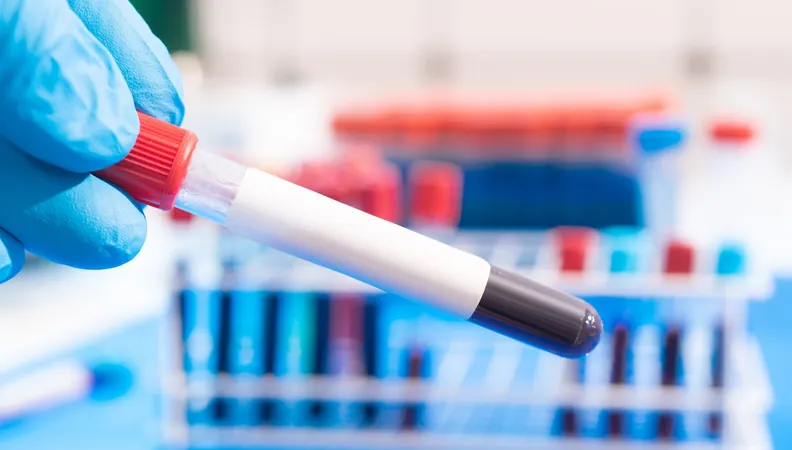
Breakthrough Blood Test Could Detect Cancer Up to 3 Years Early!
2025-06-30
Author: Nur
Revolutionary Cancer Detection Advancements
A groundbreaking study reveals that blood plasma may hold the key to detecting cancers years before current diagnostic methods, potentially transforming how we approach cancer screening.
Published in *Cancer Discovery*, researchers have discovered free-floating DNA from precancerous cells in blood samples donated up to three years before a cancer diagnosis was made. This significant finding offers hope for earlier interventions, which are critical for improving survival rates.
Could This Be the Future of Preclinical Cancer Screening?
Catherine Alix-Panabières, a leading cancer researcher, emphasizes the importance of this early detection, stating that it could be revolutionary for cancer screening practices. "Early detection typically correlates with better outcomes across many cancer types due to earlier intervention," she remarked.
How Did Researchers Uncover These Early Cancer Signals?
The research team at Johns Hopkins University analyzed plasma collected from patients nearly 40 years ago, focusing on those who developed cancer shortly after donating. They found significant genetic mutations tied to cancer in several samples, suggesting that these markers can appear years before tumors become evident.
Out of 26 participants who later developed cancer, they discovered mutations in the blood samples of seven individuals, further confirming the potential for early detection.
A Cautious Approach: What's Next?
While the study indicates promise, it also highlights limitations. Not all samples yielded cancer DNA, and some cancers may not release detectable DNA into the bloodstream. This raises questions about how effective the test would be across different types of tumors.
Moreover, the findings are preliminary and based on a small sample size. Experts suggest that larger studies involving hundreds or even thousands of participants are crucial for validating these early detection techniques before they become a standard practice.
Ethical Implications and Future Prospects
The ethical considerations of implementing such tests in routine screenings are immense. Clear guidelines regarding incidental findings are necessary to avoid undue anxiety for patients.
Considering the cost of personalized DNA sequencing, experts believe that even if validated, this test might primarily benefit high-risk populations rather than everyone.
A Diverse and Inclusive Future
The recent study primarily involved participants aged 45 to 64 from various US states, underscoring a need for future research that includes more diverse genetic backgrounds. This inclusivity will be vital in understanding the test's effectiveness across populations.
With ongoing research and clinical trials, we may be on the brink of a new era in cancer detection—one that ultimately saves lives with earlier diagnoses.



 Brasil (PT)
Brasil (PT)
 Canada (EN)
Canada (EN)
 Chile (ES)
Chile (ES)
 Česko (CS)
Česko (CS)
 대한민국 (KO)
대한민국 (KO)
 España (ES)
España (ES)
 France (FR)
France (FR)
 Hong Kong (EN)
Hong Kong (EN)
 Italia (IT)
Italia (IT)
 日本 (JA)
日本 (JA)
 Magyarország (HU)
Magyarország (HU)
 Norge (NO)
Norge (NO)
 Polska (PL)
Polska (PL)
 Schweiz (DE)
Schweiz (DE)
 Singapore (EN)
Singapore (EN)
 Sverige (SV)
Sverige (SV)
 Suomi (FI)
Suomi (FI)
 Türkiye (TR)
Türkiye (TR)
 الإمارات العربية المتحدة (AR)
الإمارات العربية المتحدة (AR)